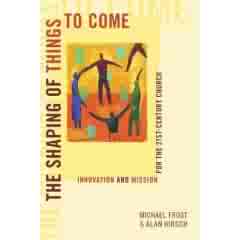 I just returned from the missional church gathering sponsored by Missio in Denver. Missio is a group working in Colorado and the Intermountain West that is attempting to plant new churches, and help "re-missionalize" existing traditional and contemporary churches in missional ways. That is, they are working to reapply the heart of Scriptures and Christianity, the missio Dei, or a truly missional sense of being that is at the heart of Christianity, and which is reflected in cross-cultural missions, in order to transform churches for missional engagement in twenty-first century America. One of the ways that Missio does this is through their ZerOrientation training that helps existing churches recognize and come to grips with the cultural shift of the West toward postmodernism, the decline of Christendom culture, and how churches must respond missionally.
I just returned from the missional church gathering sponsored by Missio in Denver. Missio is a group working in Colorado and the Intermountain West that is attempting to plant new churches, and help "re-missionalize" existing traditional and contemporary churches in missional ways. That is, they are working to reapply the heart of Scriptures and Christianity, the missio Dei, or a truly missional sense of being that is at the heart of Christianity, and which is reflected in cross-cultural missions, in order to transform churches for missional engagement in twenty-first century America. One of the ways that Missio does this is through their ZerOrientation training that helps existing churches recognize and come to grips with the cultural shift of the West toward postmodernism, the decline of Christendom culture, and how churches must respond missionally.Alan Hirsch was an important part of this gathering. Alan and Michael Frost co-authored The Shaping of Things to Come (Hendrickson/Strand, 2004), and they work with the Forge missions network in Australia. I was fortunate to meet with Alan during a short-term missions trip to Australia in 2004. I was impressed with his insights and vision, and it was good to spend some time with him in connection with this gathering.
Alan gave a presentation to a diverse group of about seventy people last Friday night. Much of the subject matter for his presentation is found in his book, and from ideas he has developed for his forthcoming book The Forgotten Ways (September 2006), which echoed back to our meeting in Australia in 2004. I jotted down a few highlights:
1. Social data in the West indicates that large numbers of people are interested in God, Jesus and spirituality (variously defined), but they are not interested in the church. In fact, the church is strongly denounced as a place where vibrant, contemporary spirituality is not to be found. Put in business terms, this means that we continue to have a good "product" (Jesus), but a bad delivery system (the church).
2. The situation in Australia is worse than that in the U.S. Australia has a different history and no sense of having been a "Christian nation," so the urgency of our situation has not been felt yet to the extent it has in Australia. Even so, statistics indicate that tweny years from now, 60-70% of evangelical churches will close their doors, whether traditional or contemporary. (The jury is still out on the extent to which emerging churches are truly missional and indigenous expressions that will survive this coming reality.)
Alan then discussed elements of a missional DNA. He provided the early church and the church in China as examples and case studies of phenomenal church growth and multiplication in spite of intense persecution, no formal church buildings, no paid clergy class, and no completed canon of Scriptures (elements we assume must be present for churches in the modern context). What did the early church and the church in China share in common as factors that account for their success? In Alan's presentation the following three items stuck out for me:
1. Jesus-based movements. They both include an emphasis on Jesus at the center of their existence and efforts as opposed to an emphasis on buildings, programs, or even the Scriptures. While the story of Jesus is an essential aspect of this centering, this is distinguished from an emphasis on the Scriptures per se.
2. Missional incarnational impulse. The emphasis of both of these Jesus-centered movements was a focus on the mission Dei within the cultures in which they moved. This outward focus and activity was incarnated within individual subcultures in indigenously appropriate expressions.
3. Organic systems. Rather than static organizations, these movements were more like organic systems and movements. This and other factors indicates that both the traditional and contemporary church models and forms in the West are aberrations of a biblical, missional model and approach.
I was also able to spend a good amount of time with Dr. Curt Watke of the Intercutural Institute for Contextual Ministry. I continue to be impressed with his depth of knowledge, awareness of the missional "needs of the hour," and his ability to provide specific data and strategy for missions endeavors in the West.
This was a wonderful trip with lots of good networking, nurturing of existing and creation of new relationships, and opportunities for the future. May the new revolution of the missional movement in the West continue through these and other leaders.
No comments:
Post a Comment